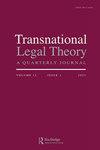International corporate constituency as a human problem
Q2 Social Sciences
引用次数: 0
Abstract
ABSTRACT This article frames constituency in relation to international corporate persons (ICPs) as a Jessupian ‘human problem’, constructively and politically. Drawing from examples in international trade law and international investment law it demonstrates the transformative power of ICP interests in the making of contemporary international economic law (IEL). It then analyses the logics of the economic and legal thinkers who facilitate this power in IEL and suggests these logics enabled a corporate constituency that separates the interests of the law from the interests of humans, both as subjects of law and as sources of institutional legitimacy. In the process, it shows that at least one ‘human problem’ with IEL’s corporate constituency—and by extension IEL itself—is that it is based on domestic market wisdoms projected internationally. By failing to account for the political and legal influence of the most significant transnational market participants, IEL is structurally insulated from human problems.国际企业选区作为一个人类问题
本文将与国际法人(icp)相关的选区框架为耶稣会式的“人类问题”,具有建设性和政治性。从国际贸易法和国际投资法的例子中,它展示了ICP利益在当代国际经济法(IEL)制定中的变革力量。然后,它分析了经济和法律思想家的逻辑,他们促进了IEL中的这种权力,并表明这些逻辑使公司选区将法律的利益与人类的利益分开,既是法律的主体,也是制度合法性的来源。在这个过程中,它表明,至少有一个“人类问题”与IEL的企业选民,并延伸到IEL本身,是基于国内市场的智慧投射到国际上。由于没有考虑到最重要的跨国市场参与者的政治和法律影响,国际经济关系在结构上与人类问题隔绝。
本文章由计算机程序翻译,如有差异,请以英文原文为准。
求助全文
约1分钟内获得全文
求助全文
来源期刊

Transnational Legal Theory
Social Sciences-Law
CiteScore
2.10
自引率
0.00%
发文量
7
期刊介绍:
The objective of Transnational Legal Theory is to publish high-quality theoretical scholarship that addresses transnational dimensions of law and legal dimensions of transnational fields and activity. Central to Transnational Legal Theory''s mandate is publication of work that explores whether and how transnational contexts, forces and ideations affect debates within existing traditions or schools of legal thought. Similarly, the journal aspires to encourage scholars debating general theories about law to consider the relevance of transnational contexts and dimensions for their work. With respect to particular jurisprudence, the journal welcomes not only submissions that involve theoretical explorations of fields commonly constructed as transnational in nature (such as commercial law, maritime law, or cyberlaw) but also explorations of transnational aspects of fields less commonly understood in this way (for example, criminal law, family law, company law, tort law, evidence law, and so on). Submissions of work exploring process-oriented approaches to law as transnational (from transjurisdictional litigation to delocalized arbitration to multi-level governance) are also encouraged. Equally central to Transnational Legal Theory''s mandate is theoretical work that explores fresh (or revived) understandings of international law and comparative law ''beyond the state'' (and the interstate). The journal has a special interest in submissions that explore the interfaces, intersections, and mutual embeddedness of public international law, private international law, and comparative law, notably in terms of whether such inter-relationships are reshaping these sub-disciplines in directions that are, in important respects, transnational in nature.
 求助内容:
求助内容: 应助结果提醒方式:
应助结果提醒方式:


